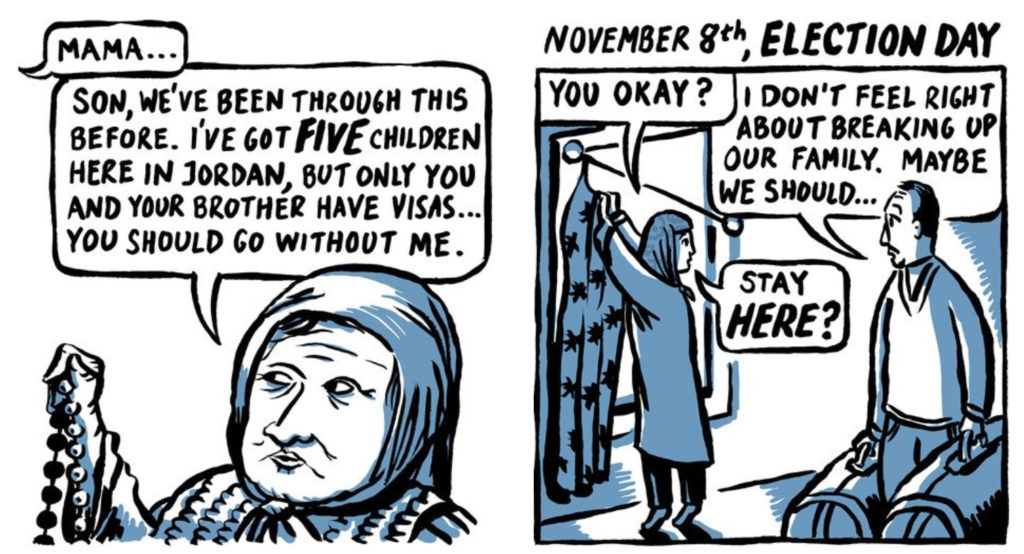The announcement of this year's Pulitzer Prizes reminds me: Subscribe to a newspaper. Journalists do important work holding power accountable & seeking the truth from those who want to hide it. Well-reported news isn't free.
— John Robinson (@johnrobinson) April 16, 2018
I always look forward to when the Pulitzer Prizes get announced. Not just for the predictable ones (well deserved!) that go to news outlets like the New York Times, The New Yorker and The Washington Post for reporting on issues of global import, but also those that go to local and regional papers for coverage that would otherwise not get the attention they richly deserve. Here’s a summary of who won the major prizes (i.e., the one’s I care about) this year:
Jake Halpern & Michael Sloan – For Editorial Cartooning
To call “Welcome to the New World” and editorial cartoon is vastly underselling the tremendous accomplishment by writer Halpern and cartoonist Sloan. This is nothing less than a graphic novel treatment of the story of a real-life refugee family from Syria who left for the United States on 2016 election day. What? No! I wasn’t grabbing a handkerchief… Really. All kidding aside. This is visual storytelling at it’s best. And while other stories will be more consequential overall, this is the one that really hit me.
And here’s an interview with writer Jake Halpern talking about how he got involved with the project from Buffalo Spree magazine.
The Roy Moore Senate Race Story from Alabama
There were two separate prizes given to two very different news organizations on the Roy Moore sex abuse senate race story.
Not surprisingly, the Washington Post got the Pulitzer for Investigative Reporting tor their “purposeful and relentless reporting that changed the course of a Senate race in Alabama by revealing a candidate’s alleged past sexual harassment of teenage girls and subsequent efforts to undermine the journalism that exposed it.”
Part of what made the Post’s reporting so compelling was not just the true things they reported, but the false reports they uncovered. The following video tells the story of an attempt to get the Post to report on a made-up story about Moore paying for an abortion.
The second Pulitzer for the Roy Moore story went to John Archibald of the Alabama Media Group out of Birmingham, Alabama for his commentary on a state that he clearly loves and is still able to be critical of. The Moore story was just one of the one’s he wrote about so beautifully. In a column published the day after Alabama elected Democrat Doug Jones to the U.S. Senate instead of Roy Moore, Archibald says:
But Alabama, against the odds and conventional wisdom, stood and rejected that behavior.
It did not condone the silence. It did not excuse the sin.
It made a political decision that many found hard, a decision that put decency over party, character over tribe. It stood for its mothers and sisters and daughter and fellow human beings.
When nobody thought it would.
That’s the message Alabama sent yesterday. Not just about politics, or fear, or loathing, or habit, or even Donald Trump.
It sent a message to women: This has not been a safe place. But it can be. It can.
And finally, I would note Andie Dominick of the Des Moines Register winning for her editorials on Iowa’s privatizing of the state’s administration of Medicaid, and what that means for health care for Iowa’s poorest citizens. There is an old platitude that says it is the job of journalists to comfort the afflicted and afflict the comfortable. And that’s clearly what’s going on here. (I would also note that this is two years in a row that the Pulitzer for editorial writing has gone to an Iowa newspaper. Last year it went to Art Cullen, editor of the Storm Lake Times.)
I might also note that two of the stories I’ve singled out for discussion here deal with diabetes one form or another. Ms. Dominick has also written a memoir about living with diabetes, and the mother in “Welcome to the New World” is dealing with living as a refugee with diabetes.
Here’s a link to all the rest of this year’s winners. There’s lots here I didn’t talk about. Look and read (or listen).


